THURSDAY'S SCRIPT TIP:
WRITING FROM THE HEART

1) Any script you don't care about will not turn out a good script, and probably won't sell.
2) Screenwriting is for a mass market audience, and because films are the most expensive form of storytelling to make, a screenplay needs to appeal to a mass market.
Those two statements are not contradictory.
Those two statements show the dichotomy of the art of screenwriting - and to be a successful screenwriter you need to find where those two things intersect for you.
There is no one size fits all answers on how you to write a personal story that appeals to millions of people worldwide, but this Script Tip is going to explore the issue and maybe show you a path to your own answer.
The average movie costs $107 million by the time it hits your screen and needs to make around $200-300 million to break even... that means your script has to be appealing to millions of people around the world. This is nothing new in cinema - back in the 1930s when talkies were created, films were often shot in multiple languages so that they would appeal to a global audience. DRACULA was shot in English and in Spanish. Hitchcock often shot films in English and German. The actors would do the dialogue in one language, then either do it in other languages or a different actor would step in to do it in some other language. In the 1970s TV movies were often filmed with extra scenes for the foreign theatrical release. Film has *always* been a global business - that is nothing new... and your screenplay needs to appeals to the world...
And also be written from the heart.
Not contradictory.

Writing an entertaining film doesn't mean you have to sell out... In fact, if you “sell out” and just hack out what you think is going to sell, you are doing inferior work and it probably won't sell. If you aren't emotionally involved in your story, why would you expect millions of people worldwide to become emotionally involved in it? The key is to find the common ground - the story that you want to tell that millions of people worldwide want to hear. If that sounds difficult, you understand why screenwriters are paid more than any other form of writing (except maybe ransom notes). Some writers are better suited to telling stories that appeal to smaller audiences, and novels, short stories and stage plays might be the perfect market for their work. A novel aimed at a small audience can do a short print run. Stage plays are performed in one theatre at a time, and the costs of mounting a play can be minimal.
But let's stick with screenwriting...
When it comes to screenwriting in the USA, all roads lead to Hollywood. If you write something “commercial” and sell the screenplay - it will sell to a company that is either part of the system, or will eventually make a distribution deal with a company within the system. Hey, that might include Amazon and Netflix, which are not geographically in Hollywood, but still part of what we usually refer to as “Hollywood” - the film business. If you write an arty screenplay and it wins the Nicholl or Austin or some other big contest? You will end up with meetings with Hollywood producers. Paul Attanasio, the award winning writer of QUIZ SHOW... was one of the writers hired to rewrite ARMAGEDDON. Those “arty” writers who write Oscar quality screenplays end up with careers doing rewrites in Hollywood on stuff like ARMAGEDDON. Hey, they are often rewarded with a deal on one of their screenplays every once in a while, but the business is about writing big event movies that can sell millions of tickets around the world. All roads lead to Hollywood.
So how do you keep your soul, and write screenplays that will be made and seen?
WHO ARE YOU?

Before you can figure out how you - as an individual - can find your place in the business side of writing screenplays, you need to know who you are. I mean, who you really are. So we are going to begin this little exercise with a could of questions...
1) Make a list of ten films you really love.
2) Make a list of recent films you couldn't wait to see in the movie theater.
I always say to write the kinds of movies that you regularly pay to see in the cinema, and I think that is the basis for anyone considering screenwriting as a career. “You are what you eat” - and you write the kinds of movies that you love.
When you look at that recent films list - that's YOUR market. Your market, not mine and not "Hollywood's". You are the target audience for those films. Those are the type of films you care about seeing, the kind of films you love, so that's what you should be writing. Without any hype, without a single TV ad, I would still have gone to see JOHN WICK 3 and FAST & FURIOUS: HOBBS AND SHAW and a bunch of other action films and thrillers and horror movies like IT: CHAPTER 2 that were released last year. Those are genres that I love - and the kinds of movies that I regularly pay to see. I love action movies, and I especially like funny ones... I am not a tough guy, but wish that I were. I was bullied in school, and developed a sense of humor as a form of armor to deal with that. So in my twisty mind physical action and humor are elements of power that I admire. Though I thought HOBBS & SHAW was disappointing, it was still the type of movie that I enjoy (just wish it had been better). I have been watching martial arts movies since I was a kid and one of the UHF channels had Kung Fu Theater. I am a total klutz, so I love people who are graceful - I wish that I were graceful. So martial arts movies appeal to me for personal reasons. I have been a fan of horror movies - again I love the ones with a sense of humor or a character with a sense of humor, and I read a lot of Stephen King... so IT: CHAPTER 2 is a film I would have seen if it wasn’t based on a King novel and wasn’t a part two... and I wish it had been as good as CHAPTER 1, but that’s not what this is about. It’s about wanting to see it in the first place, and figuring out WHY I like horror movies. Why that genre appeals to me. There is a *reason* why I love the movies that I love - and there is a reason why you love the movies that you love, and it will help you to know what that reason it... because that can show you where you fit in. How you can write a *personal story* that is also commercial.
So make your lists, and then realize that the lists are a mirror to your soul, and the way that you can pour your heart and soul into a commercial screenplay. A path to finding your story within a commercial story. I write about myself and my issues within popular genres by using my imagination to put myself into that story... and then use my imagination to create the sort of exciting story that I would be first in line to see in the cinema.
FOUR CATCH 22s...

I think the key to success as a screenwriter is to write the films you regularly pay to see in the cinema - those are the films that *you* care about, and Hollywood is paying someone to write those films... and that someone could be you. But there's a catch: You have to be excited enough about movies and interested enough about movies to want to stand in line to see them in the cinema. Yeah, we don’t have lines anymore, we have online ticketing, but if every movie that comes out is something that you’ll wait to see on Netflix or some other form of aftermarket, you don’t seem very excited about that film... or films in general. Yes, movies are expensive. But as the adverts used to say, “If you only see one movie this year...” are you seeing that movie? What is that movie? “You are what you eat” doesn’t work if you don’t eat anything. If you aren’t part of the cinema audience. Hey, if you are financially strapped, and you do wait for video - what are the new films that you absolutely need to see? But not seeing movies in a cinema can be a problem if you are writing for an audience tyhat you are not a part of.
Another catch: You have to be seeing current movies. If you haven't seen a movie in 30 years, you may be writing great films... for the 1980s. Great if you have a time machine! There are wanna be writers who *hate* current movies and would rather watch movies from the 80s or 90s or 60s or 70s... which is a problem, because even though we get the occasional 70s throwback made independently like UNCUT GEMS, that wasn’t a screenplay that was *sold*. That was something that the writers found the money to make themselves. You may have loved that film, but it didn’t make enough money for the business to drop everything and start making more movies like it. If you want to write screenplays for movies made in 2020, you need to write the kind of movies that are made in 2020. Not some other era. Unless you have a time machine.

Another catch: Your list of films may be all import films, or all Indie films like UNCUT GEMS made by writer-producer-directors who just did it themselves. If that's true, you'll either need to move to some darned foreign country or make the film yourself. Your script has to follow the same path as the scripts to the films you love. If you love independent films and you want to write independent films you have to do things the independent way... and most indie films are written-directed-produced by the same person. All of those French films are made by French people - and many foreign films are funded by arts programs designed to employ local artists and protect and project the country’s culture. So you need to be a French citizen to make films like that. But we live in a world were you can make a movie on your smart phone, and many people are just making their own movies - my WRITE IT, FILM IT book has some helpful information on how to do that... but if you are making a film on a limited budget, note that will limit what you can write. If you are against all compromises, you are in trouble - because you will be forced to compromise for budget. Even independent films shot on your smart phone cost money to make... and once you have made it? How do you get it to an audience? All roads lead to Hollywood again. You need to find a distributor (what Hollywood actually is - movie distribution) or self distribute it... to some platform like Amazon that is “Hollywood adjacent” and then try to figure out how to get people to watch it. You have many of the same problems.
Fourth catch: If your list has CATS or ISHTAR or GOLDFINCH or other films that never made any money, you are in big trouble... No one wants to make a film that loses money. Not even Indie producers. They make their films to attract their audience. Those art house films are commercial ventures. Even though an art house movie is made on a smaller budget and doesn't need 20 million people to break even, it *still* needs to attract an audience. And a studio film like CATS? There are people who seem to be contrarians - they hate the movies that everyone else loves and love the moves that everyone else hates. That’s a serious problem with a mass market medium like film - at any budget. You are out of sync with the world. If you find your list of recent films are all big money losers that couldn't find an audience, I don't know what you should do. Okay, here’s an idea - make your own films out of pocket and see if you can build a big enough following to eventually crowd source the budgets. There’s a place for everyone - but sometimes not a place that pays you. I have a friend who makes a film every year, self financed, and puts it up on YouTube for free. You could do that.
WHERE DO YOU FIT IN?

Commercial isn't a dirty word - it just means that people will like it. That you will be communicating with more people. I think rejecting the market is self destructive. I used to write short stories, and Writers Market always listed what magazines wanted - including the exact story length (word count) and what the story should be about based on the magazine's specific demographics. Name the famous short story writer, and they wrote to fit what the magazine wanted. We read these stories now and think the writer was just writing whatever they wanted... whatever they felt like writing... but to get published you need to write what a Magazine wants to buy. Magazines have always needed to sell subscriptions and adverts and have targeted content to match those two elements. There was a great column by Lawrence Block in Writer’s Digest Magazine decades ago about writing to market - and how he was specifically writing a short story for Playboy Magazine (highest paying market at the time). Now here’s the thing about that column - Block targeted the market that fit the story he wanted to write. He had other columns where he targeted a story to Ellery Queen Mystery Magazine - the story fit their needs and subject matter. He wasn’t just writing whatever Playboy or Ellery Queen wanted, he was writing what he wanted to write... knowing that it would have to be published in a magazine if he was going to be paid, so he targeted the specific needs of the magazine that the story had the best chance of selling to.
Movies in the USA are a commercial endeavor. They cost money to make and a movie (based on your screenplay) is expected to sell enough tickets to make a profit. Buying a screenplay is an *investment* that they hope will pay off. Now, you can fight that or accept it. Makes no sense to me to fight it. Once you accept it, then you have to work with it, and there are two things that I always look at:
1) The Venn Diagram. Mainstream Hollywood movies - those designed to make a crapload of money - are diverse. They make all kinds of genres. Somewhere in that circle of Hollywood Mainstream Movies there is an intersection with that circle of Movies I Love And Want To Write. Or, there should be. If you are a movie lover, there are some movies you love. And even though you may not love the specifics of how some movie turned out, you love the type of movie. You are buying tickets to *something* every week, right? So write that type of movie... and if the versions of those films you see every week disappoint you, write the best version of those films. Part of the process is that they will take your great script and turn it into crap... but that is after they have bought it. You need to write the great version so that after screwing it up the crap version that hits the screen is watchable. You write the great version of a mainstream film, not the stupid version. But that Venn Diagram means you need to include all of the things the ticket buying audience wants to see. There are great movies with explosions and crappy movies with explosions - it's not the *explosions* fault if the film is crappy. If you write an action movie without any action, people will probably not want to see it and you’ll have one of those Catch 22 flops.

2) You need to find the way to tell your personal story in a way that hundreds of millions of people worldwide will pay to see it. That is a skill. You have to work at that skill. If you ignore or avoid learning that skill and practicing that skill, what do you think will happen? This requires creativity and imagination - basic skills if you are a writer. Basics. A child imagines that they are a superhero... you need to be able to imagine at the same level as a child. Imagine your story - your *personal* story - in a mainstream genre with higher stakes and deeper drama. Magnify your problem or emotion to fit a larger and more exciting story - there’s a section on Magnification in the Ideas Blue Book. When you watch a movie like CAPTAIN AMERICA: THE WINTER SOLDIER, that whole movie is about Cappy’s moral dilemma - he’s a 1940s straight arrow guy who believes in Good and Bad in a morally ambiguous world. Should he give in to that world? Or stay true to himself? If you watch that movie again and just look at that problem in every scene - you will find it. His discussions with the Black Widow are all about that. Nick Fury is also dealing with that issue - he has compromised himself morally for what he thinks is the betterment of mankind... and it has backfired. The relationship between Cappy and the Winter Soldier is *all about* that, too. The whole comic book film is really about larger issues of maintaining your moral compass in a new, darker world. Maybe for the screenwriters it’s also about maintaining their *hearts* while writing a big Hollywood blockbuster? They succeeded. They wrote the movie that they wanted to write that Hollywood wanted to make. The perfect place on the Venn Diagram.
I have other Script Tips that look at how I have used that time in my life when I was screwed over by a friend and turned it into my screenplay for NIGHT HUNTER about the last of the vampire hunters who can’t trust anyone around him because the minute they are bitten they become the enemy. A personal story, told in an exciting genre. I have a Script Tip about using my emotional issues with not being my father’s favorite son to write the screenplay for my Showtime flick BLACK THUNDER. I have Script Tips about writing all kinds of big commercial stories that were at their core very personal stories for me. I was writing from the heart... with my imagination providing the explosions or car chases or vampires or submarine battles. The Venn Diagram overlapped my personal story with a big exciting way to tell that story. And that’s what you need to do - find the way to tell your stories in a way that millions of people around the world will want to see.
You find the way to use your imagination in order to work within the system. You do what a 5 year old does. All roads lead to Hollywood - go in some other direction and you may not get anywhere. The trick is to find the way to have fun getting there, and be a Hollywood screenwriter *and* yourself. To write from your heart, for the hearts of millions of people around the world.
BRAND NEW!
How Do I do That?

101 SCREENWRITING ANSWERS Blue Book!
New to screenwriting? You probably have questions! How do I get an Agent? How do I write a phone conversation? Do I need a Mentor? What’s does VO and OC and OS mean? What is proper screenplay format? Should I use a pen name? Do I need to movie to Hollywood? What’s the difference between a Producer and a Production Manager, and which should I sell my script to? How do I write a Text Message? Should I Copyright or WGA register my script? Can I Direct or Star? How do I write an Improvised scene? Overcoming Writer’s Block? How do I write a Sex Scene? And many many more! This book has the answers to the 101 Most Asked Questions from new screenwriters! Everything you need to know to begin writing your screenplay!
All of the answers you need to know, from a working professional screenwriter with 20 produced films and a new movie made for a major streaming service in 2023!
Only $4.99
NEW!!!
Can You Make It bigger?

BLOCKBUSTERS (and BEACH READS) Blue Book!
Writing something EPIC?
ONLY: $4.99!
Thinking about writing a big Disaster Movie? An Historical Epic? An Epic Adventure Film? Or maybe you like Gladiator Movies? This book looks at writing Blockbusters and those Big Fat Beach Read novels - anything epic! Usng movies like JAWS, POSEIDON ADVENTURE, LAWRENCE OF ARABIA, THE GUNS OF NAVARONE, and those MARVEL and FAST & FURIOUS flicks as examples. What *is* a Blockbuster? 107 years of Blockbuster history! Blockbuster Characters. Blockbuster Story Types! Why modern Blockbusters are soap operas! Social Issues in Blcokbusters? Big Emotions! Keeping All Of Those Characters Distinctive! How to avoid the Big problems found in Big Movies and books! More! If you are writing a Big Event Movie or a Big Fat Novel, there are tips and techniques to help you!
Only $4.99
BRAND NEW!
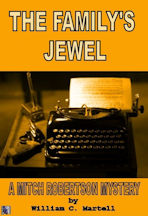
***
MITCH ROBERTSON #2: THE FAMILY'S JEWEL *** - For Kindle!
"The Presidential Suite of the Hollywood Hoover Hotel looked like a bloody battlefield: bodies everywhere, furniture broken, red liquid dripping from the walls, dead soldiers littering the elegant Berber rug as clouds of smoke overhead bounced between two air conditioning vents.
Mitch Robertson stepped over the body of an ex-child star turned sex tape star turned pop star and entered the room, spotted a gun on the floor and picked it up... careful not to spill his coffee with three pumps of mocha syrup from Penny’s Coffee Shop. That coffee was gold, the only thing keeping him going in this dazed state of wakefulness. The gun felt light. Holding it, he saw the silhouette of an 80s action star sitting sideways on a tipped over chair. Motionless. Was he dead? Mitch was still hung over from the Awards Party the night before, and wondered whether this was all some sort of crazy nightmare that he would wake up from... but when he tripped over the brown legs of a bottomless Superhero, flaccid junk encased in a condom but still wearing his mask, and hit the edge of the sofa, gun skittering and coffee spilling, he realized that it was all very real. What the hell had happened here?"
Short Novel. Only 99 cents - and no postage!
IT'S NEW!!
All About Rewrites!
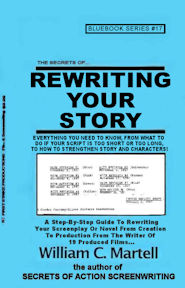
REWRITES Blue Book!
Rewriting In Waves?
When You Finish Your Screenplay Or Novel...
The Rewrites Begin!
The end is just the beginning! You’ve finished your story, but now the rewriting begins! This 405 page book shows you how to rewrite your screenplay or novel to perfection. Everything from Character Consistency to Shoeboxing to How To Give And Receive Notes to 15 Solutions If Your Script’s Too Long! and 15 Solutions If Your Script’s Too Short! to Finding The Cause Of A Story Problem to Good Notes Vs. Bad Notes to Finding Beta Readers to Avoiding Predictability to Learning To Be Objective About Your Work to Script Killer Notes and Notes From Idiots to Production Rewrites and What The Page Colors Mean? and a Complete Rewrite Checklist! The complete book on Rewriting Your Story!
Only: $4.99
HITCHCOCK FOR WRITERS!
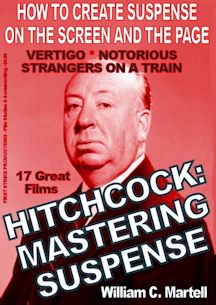
LEARN SUSPENSE FROM THE MASTER!
*** HITCHCOCK: MASTERING SUSPENSE *** - For Kindle!
Alfred Hitchcock, who directed 52 movies, was known as the *Master Of Suspense*; but what exactly is suspense and how can *we* master it? How does suspense work? How can *we* create “Hitchcockian” suspense scenes in our screenplays, novels, stories and films?
This book uses seventeen of Hitchcock’s films to show the difference between suspense and surprise, how to use “focus objects” to create suspense, the 20 iconic suspense scenes and situations, how plot twists work, using secrets for suspense, how to use Dread (the cousin of suspense) in horror stories, and dozens of other amazing storytelling lessons. From classics like “Strangers On A Train” and “The Birds” and “Vertigo” and “To Catch A Thief” to older films from the British period like “The 39 Steps” and “The Man Who Knew Too Much” to his hits from the silent era like “The Lodger” (about Jack The Ripper), we’ll look at all of the techniques to create suspense!
Only $5.99
NO KINDLE REQUIRED! Get the *free* app (any device, except your Mr. Coffee) on the order page on Amazon!
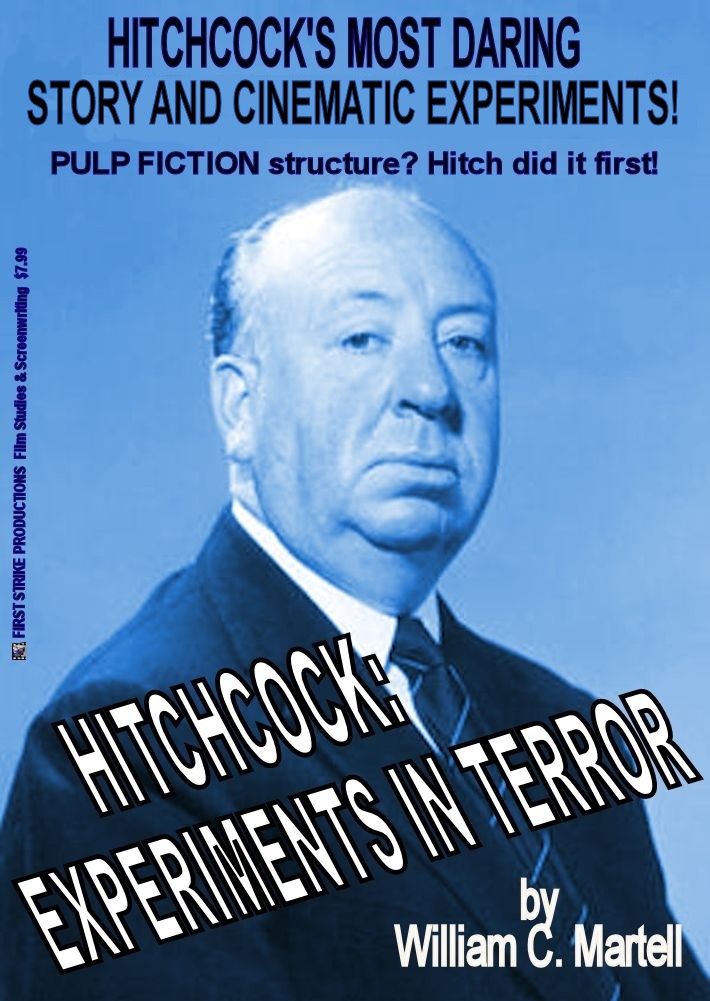
Strange Structures!
*** HITCHCOCK: EXPERIMENTS IN TERROR! *** - For Kindle!
***
Contained Thrillers like "Buried"? Serial Protagonists like "Place Beyond The Pines"? Multiple Connecting Stories like "Pulp Fiction"? Same Story Multiple Times like "Run, Lola, Run"?
HITCHCOCK DID IT FIRST!
This book focuses on 18 of Hitchcock's 52 films with wild cinema and story experiments which paved the way for modern films. Almost one hundred different experiments that you may think are recent cinema or story inventions... but some date back to Hitchcock's *silent* films! We'll examine these experiments and how they work. Great for film makers, screenwriters, film fans, producers and directors.
Only $5.99 - and no postage!
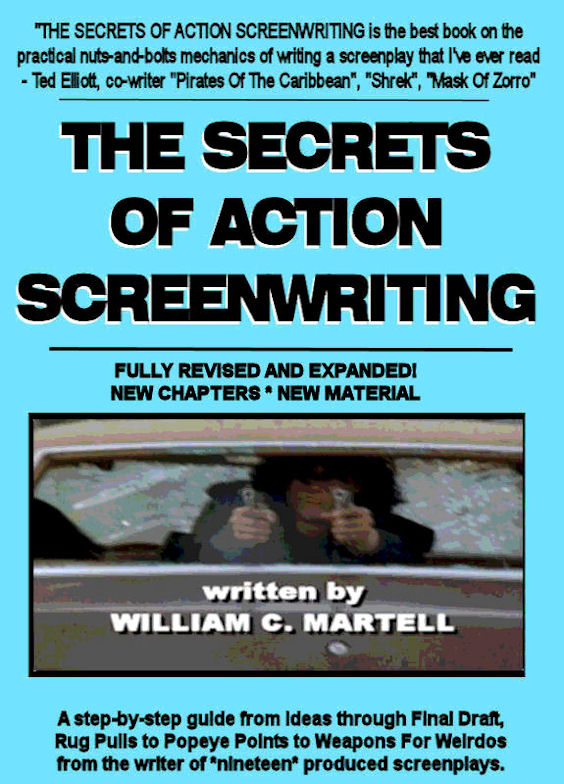
MAKES A GREAT GIFT!
*** THE SECRETS OF ACTION SCREENWRITING *** - For Kindle!
*** THE SECRETS OF ACTION SCREENWRITING *** - For Nook!
Why pay $510 for a used version of the 240 page 2000 version that used to retail for $21.95? (check it out!) when
you can get the NEW EXPANDED VERSION - over 500 pages - for just $9.99? New chapters, New examples, New techniques!
"SECRETS OF ACTION SCREENWRITING is the
best book on the practical nuts-and-bolts mechanics of writing a screenplay I've ever read."
- Ted Elliott, co-writer of MASK OF ZORRO, SHREK, PIRATES OF THE CARIBBEAN and the sequels (with Terry Rossio). (ie; 4 of the top 20 Box Office Hits Of ALL TIME.)
Only $9.99 - and no postage!
Tip FAQ

My New Script Secrets Newsletter!

STORY IN ACTION SERIES!

THE MISSION IMPOSSIBLE MOVIES
NEW: Updates On Films 7 & 8 Casting!
All Six Movies analyzed! All of the mission tapes, all of the “that’s impossible!” set pieces and stunts, the cons and capers - and how these scenes work, the twists and double crosses, the tension and suspense (and how to generate it), the concept of each film as a stand alone with a different director calling the shots (broken in the sixth film), the gadgets, the masks, the stories, the co-stars and team members (one team member has been in every film), the stunts Tom Cruise actually did (and the ones he didn’t), and so much more! Over 120,000 words of fun info!
THE MISSION IMPOSSIBLE MOVIES - 347 Pages - Only $3.99 !

BRAND NEW!
*** THE BOURNE MOVIES
NEW: Updates on TREADSTONE TV show!
All five "Bourne" movies (including "Legacy" and it's potential sequels) - what are the techniques used to keep the characters and scenes exciting and involving? Reinventing the thriller genre...
or following the "formula"? Five films - each with an interesting experiment! A detailed analysis of each
of the films, the way these thrillers work... as well as a complete list of box office and critical
statistics for each film. This book is great for writers, directors, and just fans of the series.
Only $3.99 - and no postage!
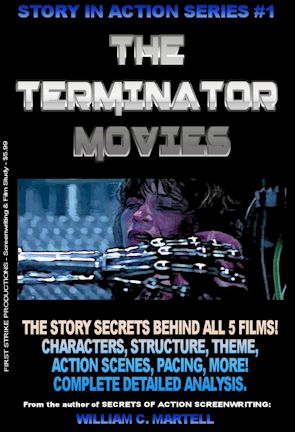
Over 240 pages!
*** THE TERMINATOR MOVIES *** - For Kindle!
He's back! The release of "Terminator: Dark Fate" is set to begin a new trilogy in
the Terminator story... 35 years after the first film was released. What draws us to these films about
a cybernetic organism from the future sent back in time? Why is there a new proposed trilogy every few
years? This book looks at all five Terminator movies from a story standpoint - what makes them work
(or not)? What are the techniques used to keep the characters and scenes exciting and involving? How
about those secret story details you may not have noticed? Containing a detailed analysis of each of
the five films so far, this book delves into the way these stories work... as well as a complete list of
box office and critical statistics for each film. This book is great for writers, directors, and just
fans of the series.
ONLY $3.99 - and no postage!
NO KINDLE REQUIRED! Get the *free* app (any device, except your Mr. Coffee) on the order page on Amazon!

NEW BUT OLD!
*** VINTAGE #1: HOW TO WRITE PHOTOPLAYS *** - For Kindle!
***
Screenwriting books have been around as long as films have. This series reprints vintage screenwriting books with a new introduction and history, plus new articles which look at how these lessons from almost 100 years ago apply to today’s screenplays. Anita Loos book is filled with information which still applies.
In addition to the full text of the original book, you get the full screenplay to Miss Loos' hit THE LOVE EXPERT, plus several new articles on the time period and women in Hollywood.
Only $2.99 - and no postage!
THE BLUE BOOKS!
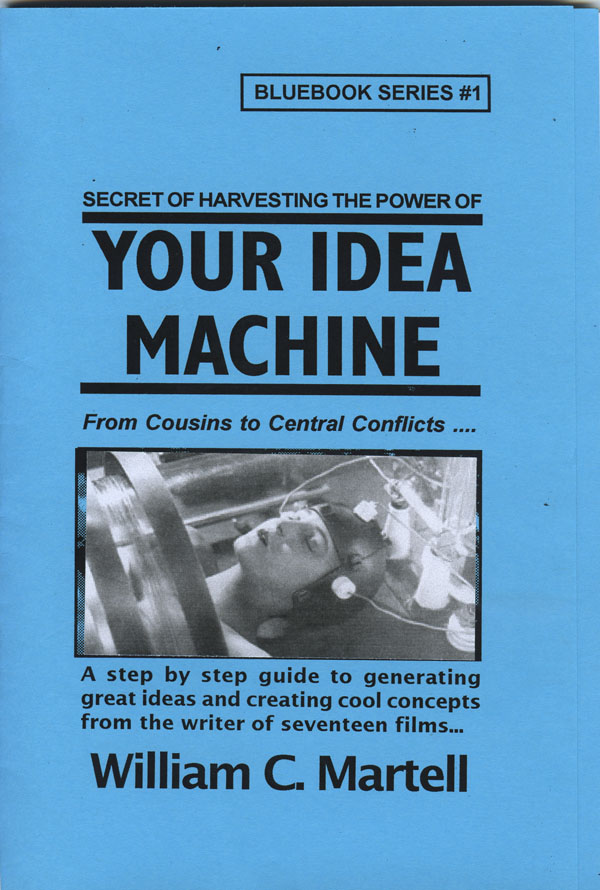
FIND A GREAT IDEA!
*** YOUR IDEA MACHINE *** - For Kindle!
****
Expanded version with more ways to find great ideas! Your screenplay is going to begin with an idea. There are good ideas and bad ideas and commercial ideas and personal ideas. But where do you find ideas in the first place? This handbook explores different methods for finding or generating ideas, and combining those ideas into concepts that sell. The Idea Bank, Fifteen Places To Find Ideas, Good Ideas And Bad Ideas, Ideas From Locations And Elements, Keeping Track Of Your Ideas, Idea Theft - What Can You Do? Weird Ways To Connect Ideas, Combing Ideas To Create Concepts, High Concepts - What Are They? Creating The Killer Concept, Substitution - Lion Tamers & Hitmen, Creating Blockbuster Concepts, Magnification And The Matrix, Conflict Within Concept, Concepts With Visual Conflict, Avoiding Episodic Concepts, much more! Print version is 48 pages, Kindle version is over 175 pages!
Only $4.99 - and no postage!
FIGURE OUT YOUR STORY!
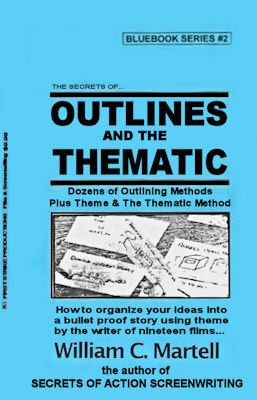
OUTLINES & THE THEMATIC Blue Book.
ARE YOUR SCENES IN THE RIGHT ORDER?
AND ARE THEY THE RIGHT SCENES?
Your story is like a road trip... but where are you going? What's the best route to get there? What are the best sights to see along the way? Just as you plan a vacation instead of just jump in the car and start driving, it's a good idea to plan your story. An artist does sketches before breaking out the oils, so why shouldn't a writer do the same? This Blue Book looks at various outlining methods used by professional screenwriters like Wesley Strick, Paul Schrader, John August, and others... as well as a guest chapter on novel outlines. Plus a whole section on the Thematic Method of generating scenes and characters and other elements that will be part of your outline. The three stages of writing are: Pre-writing, Writing, and Rewriting... this book looks at that first stage and how to use it to improve your screenplays and novels.
Only $4.99 - and no postage!
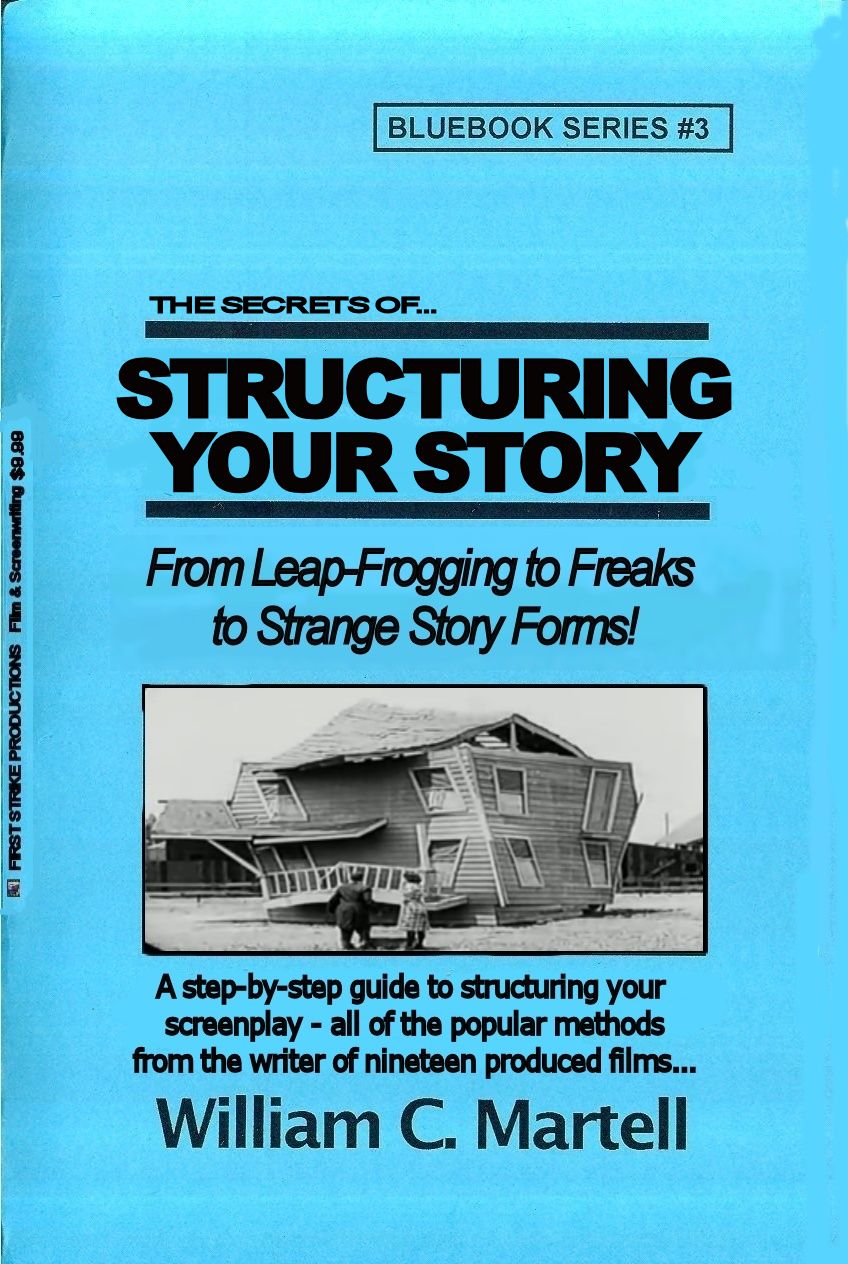
GOT STRUCTURE?!
*** STRUCTURING YOUR STORY *** - For Kindle!
William Goldman says the most important single element of any screenplay is structure. It’s the skeleton under the flesh and blood of your story. Without it, you have a spineless, formless, mess... a slug! How do you make sure your structure is strong enough to support your story? How do you prevent your story from becoming a slug? This Blue Book explores different types of popular structures from the basic three act structure to more obscure methods like leap-frogging. We also look at structure as a verb as well as a noun, and techniques for structuring your story for maximum emotional impact. Most of the other books just look at *structure* and ignore the art of *structuring* your story. Techniques to make your story a page turner... instead of a slug!
Only $4.99 - and no postage!

STORY: WELL TOLD!
*** STORY: WELL TOLD *** - For Kindle!
This book takes you step-by-step through the construction of a story... and how to tell a story well, why Story always starts with character... but ISN'T character, Breaking Your Story, Irony, Planting Information, Evolving Story, Leaving No Dramatic Stone Unturned, The Three Greek Unities, The Importance Of Stakes, The Thematic Method, and how to create personal stories with blockbuster potential. Ready to tell a story?
Print version was 48 pages, Kindle version is over 85,000 words - 251 pages!
Only $4.99 - and no postage!

START STRONG!
*** HOOK 'EM IN TEN *** - For Kindle!
Your story doesn't get a second chance to make a great first impression, and this book shows you a
bunch of techniques on how to do that. From the 12 Basic Ways To Begin Your Story, to the 3 Stars Of
Your First Scene (at least one must be present) to World Building, Title Crawls, Backstory, Starting
Late, Teasers and Pre Title Sequences, Establishing Theme & Motifs (using GODFATHER PART 2), Five Critical
Elements, Setting Up The Rest Of The Story (with GODFATHER), and much more! With hundreds of examples
ranging from Oscar winners to classic films like CASABLANCA to some of my produced films (because
I know exactly why I wrote the scripts that way). Biggest Blue Book yet!
Print version was 48 pages, Kindle version is over 100,000 words - 312 pages!
Only $4.99 - and no postage!
NO KINDLE REQUIRED! Get the *free* app (any device, except your Mr. Coffee) on the order page on Amazon!
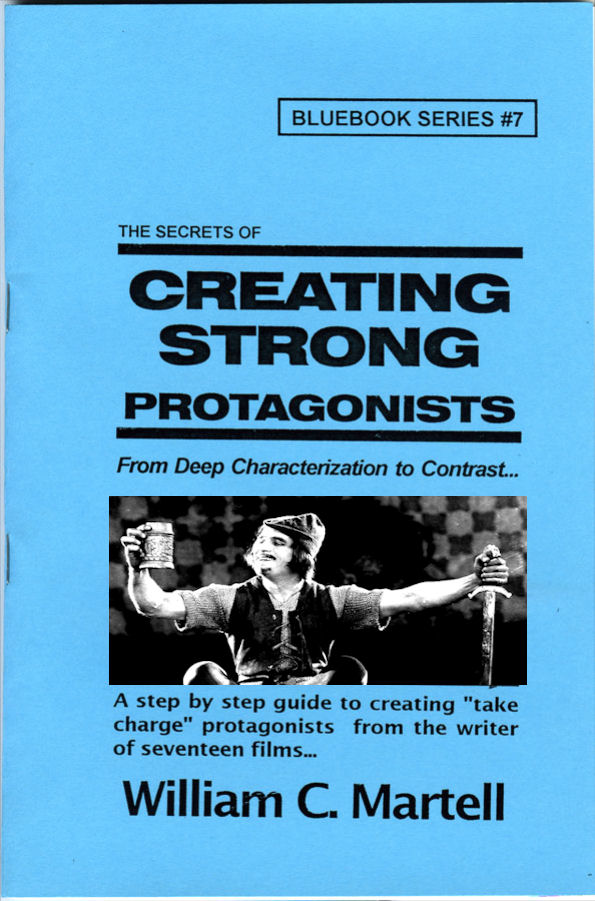
MOVIES ARE CHARACTERS!
*** CREATING STRONG PROTAGONISTS *** - For Kindle!
*** CREATING STRONG PROTAGONISTS *** - For Nook!
Expanded version with more ways to create interesting protagonists! A step-by-step guide to creating "take charge" protagonists. Screenplays are about characters in conflict... characters in emotional turmoil... Strong three dimensional protagonists who can find solutions to their problems in 110 pages. But how do you create characters like this? How do you turn words into flesh and blood? Character issues, Knowing Who Is The Boss, Tapping into YOUR fears, The Naked Character, Pulp Friction, Man With A Plan, Character Arcs, Avoiding Cliche People, Deep Characterization, Problem Protagonists, 12 Ways To Create Likable Protagonists (even if they are criminals), Active vs. Reactive, The Third Dimension In Character, Relationships, Ensemble Scripts, and much, much more. Print version is 48 pages, Kindle version is once again around 205 pages!
ONLY $4.99 - and no postage!
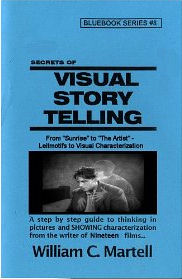
I WRITE PICTURES!
*** VISUAL STORYTELLING *** - For Kindle! (exclusive)
Show Don't Tell - but *how* do you do that? Here are techniques to tell stories visually! Using Oscar Winning Films and Oscar Nominated Films as our primary examples: from the first Best Picture Winner "Sunrise" (1927) to the Oscar Nominated "The Artist" (which takes place in 1927) with stops along the way Pixar's "Up" and Best Original Screenplay Winner "Breaking Away" (a small indie style drama - told visually) as well as "Witness" and other Oscar Winners as examples... plus RISE OF THE PLANET OF THE APES. Print version is 48 pages, Kindle version is over 200 pages!
ONLY $4.99 - and no postage!
DESCRIPTION & VOICE Blue Book!
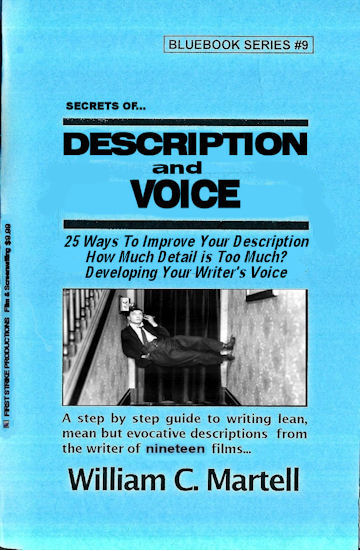
DESCRIPTION & VOICE Blue Book.
IS HALF OF YOUR STORY IN TROUBLE?
Most screenplays are about a 50/50 split between dialogue and description - which means your description is just as important as your dialogue. It just gets less press because the audience never sees it, the same reason why screenwriters get less press than movie stars. But your story will never get to the audience until readers and development executives read your script... so it is a very important factor. Until the movie is made the screenplay is the movie and must be just as exciting as the movie. So how do you make your screenplay exciting to read? Description is important in a novel as well, and the “audience” does read it... how do we write riveting description?
Only $4.99 and no postage!

PRO DIALOGUE TECHNIQUES!
*** DIALOGUE SECRETS *** - For Kindle!
***
Expanded version with more ways to create interesting dialogue! How to remove bad dialogue (and what *is* bad dialogue), First Hand Dialogue, Awful Exposition, Realism, 50 Professional Dialogue Techniques you can use *today*, Subtext, Subtitles, Humor, Sizzling Banter, *Anti-Dialogue*, Speeches, and more. Tools you can use to make your dialogue sizzle! Special sections that use dialogue examples from movies as diverse as "Bringing Up Baby", "Psycho", "Double Indemnity", "Notorious", the Oscar nominated "You Can Count On Me", "His Girl Friday", and many more! Print version is 48 pages, Kindle version is over 175 pages!
Only $4.99 - and no postage!

WHAT IS A SCENE?
*** SCENE SECRETS *** - For Kindle!
***
What is a scene and how many you will need? The difference between scenes and sluglines. Put your scenes on trial for their lives! Using "Jaws" we'll look at beats within a scene. Scene DNA. Creating set pieces and high concept scenes. A famous director talks about creating memorable scenes. 12 ways to create new scenes. Creating unexpected scenes. Use dramatic tension to supercharge your scenes. Plants and payoffs in scenes. Plus transitions and buttons and the all important "flow"... and more! Over 65,000 words! Print version was 48 pages, Kindle version is around 210 pages!
Only $4.99 - and no postage!
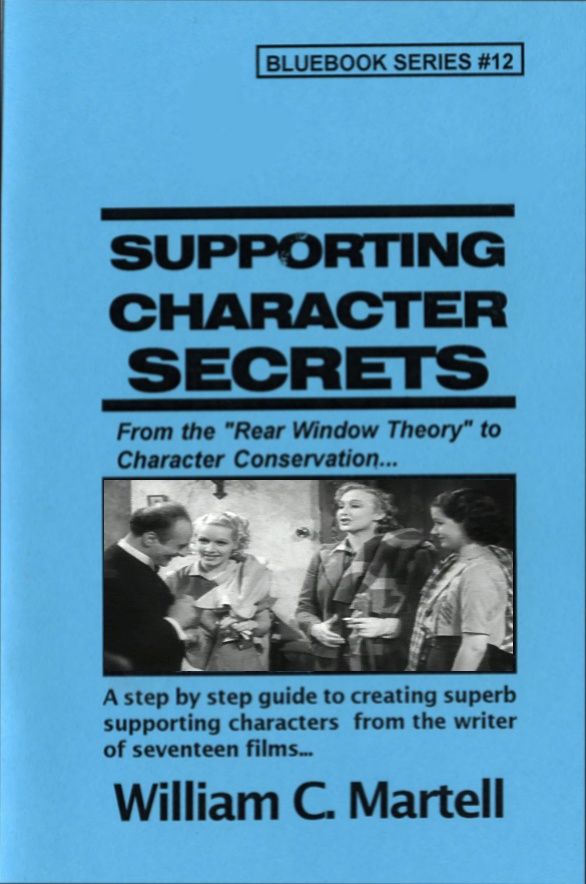
SUBPLOTS?
*** SUPPORTING CHARACTER SECRETS *** - For Kindle! (Exclusive)
Expanded version with more techniques to flesh out your Supporting Characters and make them individuals. Using the hit movie BRIDESMAIDS as well as other comedies like THE HANGOVER and TED and HIGH FIDELITY and
40 YEAR OLD VIRGIN and many other examples we look at ways to make your Supporting Characters come alive on the page.
Print version was 48 pages, Kindle version is around 170 pages!
ONLY $4.99 - and no postage!
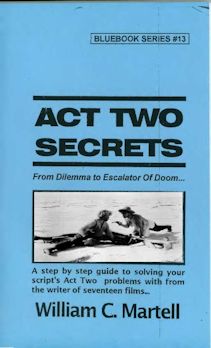
ACT TWO SOLUTIONS!
*** ACT TWO SECRETS *** - For Kindle!
Expanded version with more techniques to help you through the desert of Act Two! Subjects Include: What Is Act Two? Inside Moves, The 2 Ps: Purpose & Pacing, The 4Ds: Dilemma, Denial, Drama and Decision, Momentum, the Two Act Twos, Subplot Prisms, Deadlines, Drive, Levels Of Conflict, Escalation, When Act Two Begins and When Act Two Ends, Scene Order, Bite Sized Pieces, Common Act Two Issues, Plot Devices For Act Two, and dozens of others. Over 67,000 words (that’s well over 200 pages) of tools and techniques to get you through the desert of Act Two alive!
Print version was 48 pages, Kindle version is well over 200 pages!
ONLY $4.99 - and no postage!
All About Endings!
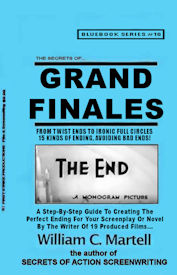
GRAND FINALES Blue Book!
The Perfect Ending For Your Story!
The First Ten Pages Of Your Screenplay Are Critical,
But What About The Last 10 Pages?
Creating the perfect ending to your story! This 100,000 word book shows you how to end your story with a bang, rather than a whimper. Everything from Resolution Order to Act Three Tools to Happy or Sad Endings? to How The Beginning Of Your Story Has Clues To The Ending (in case you were having trouble figuring out how the story should end) to Falling Action to How To Avoid Bad Endings to Writing The Perfect Twist Ending to Setting Up Sequels & Series to Emotional Resolutions to How To Write Post Credit Sequences to Avoiding Deus Ex Machinas, to 20 Different Types Of Ends (and how to write them) and much more! Everything about endings for your screenplay or novel!
Only: $4.99
NO KINDLE REQUIRED! Get the *free* app (any device, except your Mr. Coffee) on the order page on Amazon!
All About LOGLINES, TREATMENTS, and PITCHING!
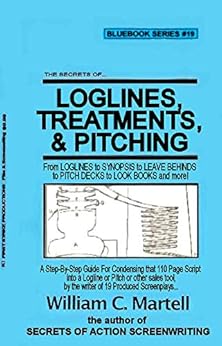
LOGLINES, TREATMENTS, and PITCHING! Blue Book!
Distilling Your Screenplay!
Loglines, Treatments, Pitching, Look Books, Pitch Decks, One Pagers, Rip-O-Matics?
You have written a brilliant 110 page screenplay, but how do you get anyone to read it? You need to distill it down into some form of verbal moonshine or story rocket fuel that will ignite that bored development executive or manager or agent and get them to request your screenplay. But how do you shrink those 110 pages into a 25 word logline or a 2 minute elevator pitch or a one page synopsis or a short paragraph? This 100,000 word book shows you how! Everything you need to know! From common logline mistakes (and how to solve them) to how your pitch can reveal story problems to the 4 types of pitches!
272 Pages - ONLY $4.99!
READY TO BREAK IN?
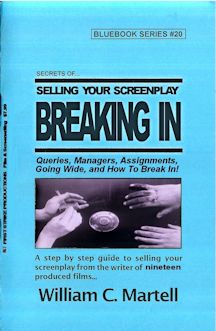
THE BUISINESS SIDE
*** BREAKING IN BLUE BOOK *** - For Kindle!
Should really be called the BUSINESS BLUE BOOK because it covers almost everything you will need to
know for your screenwriting career: from thinking like a producer and learning to speak their language,
to query letters and finding a manager or agent, to making connections (at home and in Hollywood) and
networking, to the different kinds of meetings you are will have at Studios, to the difference between
a producer and a studio, to landing an assignment at that meeting and what is required of you when you
are working under contract, to contracts and options and lawyers and... when to run from a deal!
Information you can use *now* to move your career forward! It's all here in the Biggest Blue Book yet!
Print version was 48 pages, Kindle version is over 400 pages!
$4.99 - and no postage!

Use your creative energy to focus on the content; let Final Draft take care of the style. Final Draft is the number-one selling application specifically designed for writing movie scripts, television episodics and stage plays. Its ease-of-use and time-saving features have attracted writers for almost two decades positioning Final Draft as the Professional Screenwriters Choice. Final Draft power users include Academy, Emmy and BAFTA award winning writers like Oliver Stone, Tom Hanks, Alan Ball, J.J. Abrams, James Cameron and more.
* * * Buy It!

|
|
|
|
|
SECRETS OF ACTION SCREENWRITING
|
|
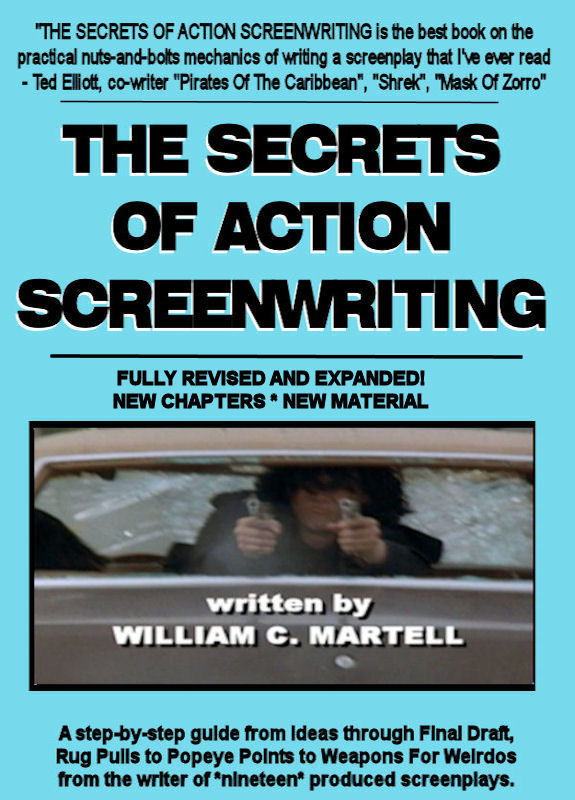 IT'S BACK! SECRETS OF ACTION SCREENWRITING
IT'S BACK! SECRETS OF ACTION SCREENWRITING
Over 460 pages packed with tips and techniques.
How to
write a plot twist,
the four kinds of suspense (and how to create it), reversals, ten ways to invent new action scenes, secrets and lies,
creating the ultimate
villain, five kinds of love interests, MORE! CLICK HERE!
|
|
CLASSES ON MP3
|
|
 CLASSES ON MP3! Take a class on MP3! GUERRILLA MARKETING - NO AGENT? NO PROBLEM! and WRITING THRILLERS (2 MP3s). Full length classes on MP3. Now Available: IDEAS & CREATIVITY, WRITING HORROR, WRITING INDIE FILMS, more!
CLASSES ON MP3! Take a class on MP3! GUERRILLA MARKETING - NO AGENT? NO PROBLEM! and WRITING THRILLERS (2 MP3s). Full length classes on MP3. Now Available: IDEAS & CREATIVITY, WRITING HORROR, WRITING INDIE FILMS, more!
Take classes on MP3!
|
|
MY OTHER SITES
|
|
B MOVIE WORLD
Cult Films, Exploitation, Bikers & Women In Prison, Monster Movies.
FIRST STRIKE PRODUCTIONS
Producing my own scripts, investment possibilities, pipe dreams.
|
|
NAKED SCREENWRITING MP3s
|
|
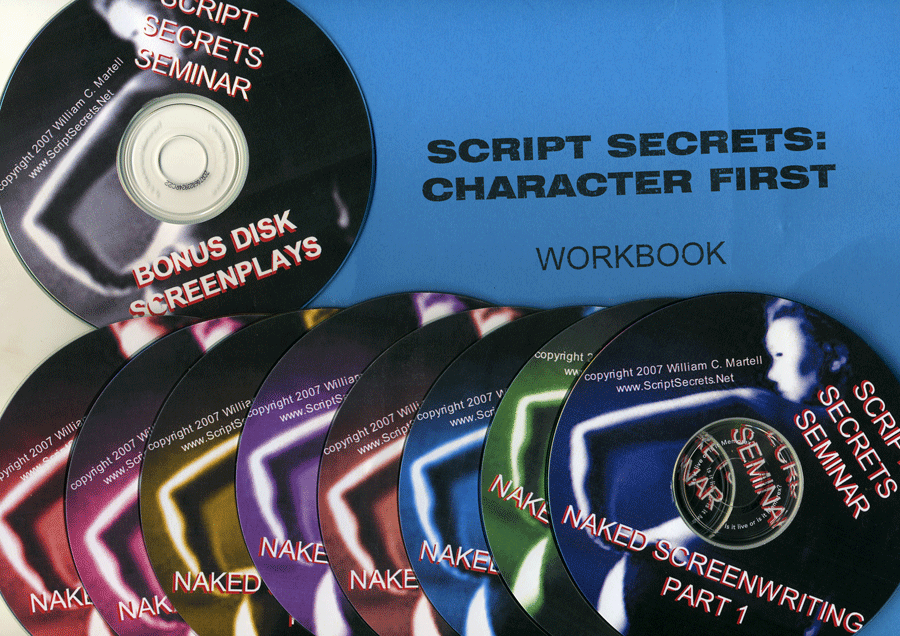 The NAKED SCREENWRITING CLASS ON MP3!
The 2001 London Class on 8 MP3s! Recorded *live* the morning after the Raindance Film Festival
wrapped. The two day class on 8CD worth, plus a workbook, plus a bonus CD.
The NAKED SCREENWRITING CLASS ON MP3!
The 2001 London Class on 8 MP3s! Recorded *live* the morning after the Raindance Film Festival
wrapped. The two day class on 8CD worth, plus a workbook, plus a bonus CD.
The 2 Day Class on MP3!
|
|
ONLINE CLASSES
|
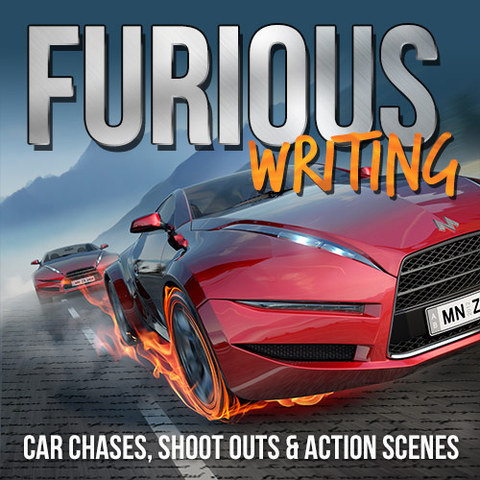
|
|
BILL'S CORNER
|
|
My
nineteen produced films, interviews with me in magazines,
several sample scripts, my available scripts list... And MORE!
...............................BILL'S CORNER
Available Scripts
|
|
E BOOKS PAGE
|
|
 E BOOKS: New Blue Books and Novelettes!
E BOOKS: New Blue Books and Novelettes!
I am expanding all of the Blue Books from around 44 pages of
text to around 200 pages! Some are over 250 pages! See what is availabale and what is coming soon!Also, I've been writing Novelletes and there
will soon be novels.
E BOOKS: BLUE BOOKS & NOVELLETES
|
|
BOOKLETS & PRODUCTS
|
|
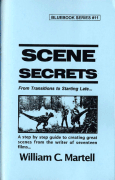 FIRST STRIKE BLUE BOOKS
FIRST STRIKE BLUE BOOKS
Each Blue Book is 48
pages and focuses on a different aspect of screenwriting. Dialogue. Visual Storytelling. Your First Ten Pages. Act 2 Booster. Protagonists. Great Endings.
Seventeen Blue Books now available!
THE SECRETS OF ACTION SCREENWRITING OUT OF PRINT!
|
|
|
|
|

